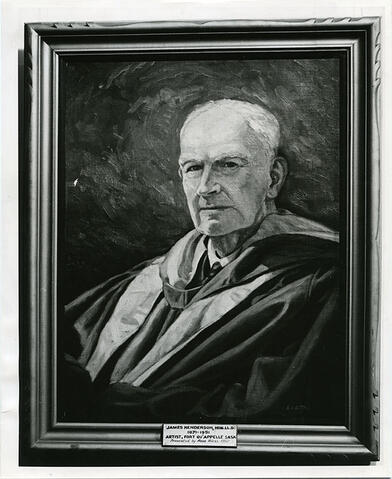
Área de título y declaración de responsabilidad
Título apropiado
Paintings - James Henderson Portrait
Tipo general de material
- Graphic material
Título paralelo
Otra información de título
Título declaración de responsabilidad
Título notas
Nivel de descripción
Item
Institución archivística
Código de referencia
Área de edición
Declaración de edición
Declaración de responsabilidad de edición
Área de detalles específicos de la clase de material
Mención de la escala (cartográfica)
Mención de proyección (cartográfica)
Mención de coordenadas (cartográfica)
Mención de la escala (arquitectónica)
Jurisdicción de emisión y denominación (filatélico)
Área de fechas de creación
Fecha(s)
-
nd (Criação)
Área de descripción física
Descripción física
1 photograph : b&w ; 25.5 x 20.5 cm
Área de series editoriales
Título apropiado de las series del editor
Títulos paralelos de serie editorial
Otra información de título de las series editoriales
Declaración de responsabilidad relativa a las series editoriales
Numeración dentro de la serie editorial
Nota en las series editoriales
Área de descripción del archivo
Nombre del productor
Historial de custodia
Alcance y contenido
Image of painting of James Henderson by Ernest Luthi.
Bio/Historical Note: James Henderson was born in 1871 in Glasgow, Scotland. He enjoyed sketching and drawing from an early age, and began an apprenticeship in lithography when he was 16 years old (1887-1894) while taking evening classes at the Glasgow School of Art. He worked in London as a commercial artist, lithographer, and engraver (1894-1909) and in 1910, immigrated to Canada. Henderson worked briefly as a lithographic artist in Winnipeg before moving to Regina, Saskatchewan and then to nearby Fort Qu'Appelle in 1916. The picturesque Fort Qu'Appelle alley, as well as Henderson's trips through western Canada and Ontario, provided him with much inspiration for his oil and watercolour landscapes. Henderson is also known for his portraits of Cree, Sioux, Saulteaux, and Assiniboine people in Saskatchewan and Alberta. These portraits gained national and international recognition — a first for a Saskatchewan artist — and Henderson was also the first Saskatchewan artist who made his living from his art practice alone. Henderson's work was exhibited mainly in Saskatoon and Regina, but also in Ontario at the National Gallery (1927, 1928, 1930, 1936), the Montreal Museum of Fine Arts (1931, 1932, 1936), and in Ontario, Alberta, Winnipeg, and London, England. He exhibited portraits at the British Empire Exhibitions at Wembley in 1924 and 1925, and with the Royal Canadian Academy in 1936. Henderson's work is represented in the collections of the National Gallery of Canada (Ottawa), MacKenzie Art Gallery (Regina), Mendel Art Gallery (Saskatoon), Edmonton Art Gallery, Calgary Public Library, University of Saskatchewan, and Glenbow Museum (Calgary), among others. Among the honours Henderson received was being named Honourary Chief at Fort Qu’Appelle’s Standing Buffalo Reserve with the name Wiciteowapi Wicasa or “the man who paints the old men,” and receiving an honorary degree from the University of Saskatchewan in May 1951. Henderson died in Regina later that year. Henderson is the subject of a significant retrospective exhibition organized by and first exhibited at the Mendel Art Gallery in 2009. A website dedicated to his life and work has been produced in conjunction with the exhibition, James Henderson: Wicite Owapi Wicasa: the man who paints the old men.
Bio/Historical Note: Ernest Luthi was born in Zeebach, Switzerland in 1906. He came with his family to homestead in Canada in 1914, settling near Punnichy, Saskatchewan. From the age of 15, he worked in farming, carpentry, house and sign painting, and on the railroad over the next twenty years to support his art practice. Though Luthi was mostly self-taught, he did take correspondence courses in illustration from the Washington School of Art in the 1920s, and night classes in Pittsburgh, Pennsylvania at the Art Institute of Pittsburgh, earning his diploma in 1928. In 1951, Luthi became a full-time artist. Luthi's work has been exhibited in Saskatchewan since 1950. His landscape paintings in oil and watercolour reflect his interest in Saskatchewan's vast skies, prairie buildings, and farming life. He often painted these from his own photographs or pastel sketches. Luthi's paintings are represented in collections including the Government of Saskatchewan, MacKenzie Art Gallery (Regina), Mendel Art Gallery (Saskatoon), Saskatchewan Arts Board, and the University of Saskatchewan. In 1975, Luthi received an Honorary Doctor of Laws degree from the University of Regina. Luthi died in Punnichy, Saskatchewan, in 1983. His home there, which he built in 1938, was designated a heritage property and converted into an art gallery.
Área de notas
Condiciones físicas
Origen del ingreso
Arreglo
Idioma del material
Escritura del material
Ubicación de los originales
Disponibilidad de otros formatos
Restricciones de acceso
Condiciones de uso, reproducción, y publicación
Other terms: Responsibility regarding questions of copyright that may arise in the use of any images is assumed by the researcher.

